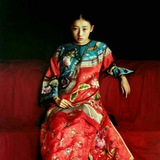
Telegram-канал sacredallegory - Sacred Allegory
 41
41
جوری که دنیا رو میبینم. Contact : @Dimitte

 41
41
جوری که دنیا رو میبینم. Contact : @Dimitte

"Extracting the Stone of Madness"
[PATHS OF THE MIRROR]
Aljendra Pizarnik
(1962)
XIX.
Dazzle of the new day, the yellow birds in the morning. A hand releases the dark; another drags the hair of a drowned woman who is crossing endlessly through the mirror. To return to the body's memory is to return to my mourning bones, and to grasp what it is my voice says.

Franz Peter Schubert
Nacht und Träume٫ D.827
A lied for Voice and Piano
by Kathleen Deanna Battle

My blueberry nights (2007), dir. Wong Kar-Wai.
Читать полностью…
Glory of the Dance (1918), by Warren B. Davis.
Читать полностью…
تنهایی باستانی، کیهانی، موروثی روی شونههامه مامان. بعد از تو جهان وارد یک فروپاشیدگی ِبیانتها شد. فروپاشیدگی ِابدی. و من، به دنیای جداشدهای از واقعیت، سلام کردم و پا در خوابی گنگ و عمیق گذاشتم.
حالا که حتی یه فرفرهی کوچیکم ندارم تا با چرخوندنش، واقعیت رو از رویا تشخیص بدم، حالا که تو این مارپیچ ِعقبگرد سقوط میکنم و دستهایی نیست که منُ از افتادن نگه داره، حالا که تو با ذوب شدن در عدم، به نفس توی ریههام و آسمون بالای سرم تبدیل شدی، حالا که خیلی سیاه و سنگینم، حالا که خودمم دیگه نمیتونم خودمو نجات بدم مامان، تو کجایی تا با نشون دادن لبخندت به تمام ِسیاهیم سیلی بزنی تا مگر از این خواب ِکرخت بیدار شم؟ تو کجایی؟
__ تابستان ۱۴۰۲.

Egon Schiele, Mother with two Children, 1915, (Figure.5).
Читать полностью…
Egon Schiele, Mother and Child, 1912, (Figure.4).
Читать полностью…
Egon Schiele, Dead Mother ll, 1911, (Figure.3).
Читать полностью…
Egon Schiele, Dead Mother l, 1910, (Figure.2).
Читать полностью…
Egon Schiele, Madonna & Child, 1908 (Figure.1).
Читать полностью…
Elle a passé tant d'heures sous les sunlights (She Spent So Many Hours Under the Sun Lamps) 1985, dir. Philippe Garrel.
Читать полностью…
To exist is to linger between what was and what could be, never fully here, never fully there.
Читать полностью…
There is a kind of sadness that comes from knowing too much, from seeing the world as it truly is. It is the sadness of understanding that life is not a grand adventure, but a series of small, insignificant moments, that love is not a fairy tale, but a fragile, fleeting emotion, that happiness is not a permanent state, but a rare, fleeting glimpse of something we can never hold onto. And in that understanding, there is a profound loneliness, a sense of being cut off from the world, from other people, from oneself.
Читать полностью…
The Dead Mother theme last appeared in a 1915 painting, Mother with Two Children (Fig.5). Her corpse-like face, gaunt and gray, indicates we are encountering the dead mother again. Her two children, dressed brightly, have vivid faces and healthy looking bodies. The blankets around them are now bright orange, not the black and charcoal of the earlier pictures. Also, the children are placed at arm’s length from the dead mother and one of them reaches towards her.
The physical distance between the children and their mother likely reflects Schiele’s psychological progress towards separating himself from the suffocating internal psychic presence he portrayed as the dead mother. The dress of the two children features the colorful geometric designs of the Viennese secessionist school, perhaps representing Art and its vital role as a force that allowed Schiele to attain autonomy and separateness.

In Mother and Child (Fig.4), painted in 1912, the baby’s terror appears unabated. Due to the use of color, the mother does not look totally “dead.” She appears to be gripping the baby too tightly, almost strangling him.
Читать полностью…
Dead Mother II (Fig.3), painted one year later in 1911, is also titled The Birth of Genius. We can only assume Schiele refers to himself, with his customary grandiosity. The mother looks more dead than in the previous painting, and the baby is full of anxiety, struggling to escape her death grip. The womb like space has exploded into an ominous birth canal. The baby’s expression is one of horror and desperation.
Читать полностью…
In Dead Mother I, 1910, (Fig.2), a baby is enclosed both by black shrouding and his mother’s boney, fleshless hand. The child is highly colored—one can almost imagine the red blood coursing under his skin. His eyes gleam with light. Around and on top of him is a pale, drawn, depressed looking, emaciated mother holding him tight with no joy. Her mouth drops slightly open, her eyes are lifeless and empty. Her lank hair adds a third layer of circular binding. The baby’s position and the shape of the black clothes are intrauterine. The baby is trapped in a tight space, encircled by deadness. There is no visible escape.
Читать полностью…
The Dead Mother Series
In 1908 Schiele painted Madonna and Child (Fig.1) that foreshadows the first dead mother painting to come two years later. While alive in structure and expression, the dark faced Madonna has blackened hands around her child’s head, almost grabbing his neck. She conveys an ominous, frightening, anti-maternal aura. In contrast, her plump light skinned child looks robust if not especially happy to be trapped in the lap of his eerie, death-giving mother.

احتضار اروس، بیونگ-چول هان | ترجمهی فریبرز همائی.
Читать полностью…